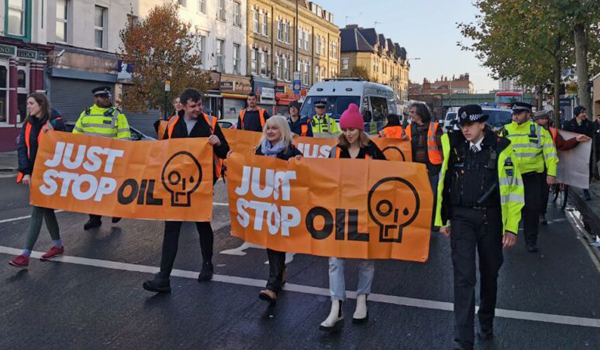Extended stop and search powers to clamp down on disruptive protestors rejected by peers
A bid to let police exercise stop and search ‘without suspicion’ to tackle disruptive protests has been heavily defeated by peers.
It was the latest in a series of setbacks suffered by the Government over its controversial plans to crack down on demonstrations.
The Public Order Bill is aimed at curbing the guerrilla tactics used by groups such as Just Stop Oil, Insulate Britain and Extinction Rebellion, which have included blocking roads, to the growing frustration of motorists.
Critics argue the actions of demonstrators can be dealt with under existing laws.
The House of Lords voted by 284 to 209, majority 75, to reject a government proposal that would allow police officers to search people without suspicion in a designated area to look for items that could be used in offences such as ‘locking on’.
Concerns had been raised over the impact such a move may have on innocent members of the public, particularly black and ethnic minority groups.
Opponents also warned against increasing officer powers at a time when trust in the police has been rocked by a series of scandals.
Former senior police officer and Liberal Democrat peer Lord Paddick said: “These are a significant expansion of police powers at a time when confidence in the police is waning.
“There is potentially an endless list of objects that could be made, adapted or intended for use in the course of or in connection with protest offences.
“Coupled with the power to stop and search without suspicion, this could result in many innocent people being stopped, searched and potentially arrested for being in possession of commonplace objects.
“If a protest takes place in central London for example, potentially shoppers in Regent Street and Oxford Street could be stopped, searched and arrested for possessing household objects they had just bought from John Lewis.”
Former Metropolitan Police Service commissioner and independent crossbencher Lord Hogan-Howe said: “Particularly in the context of London, I would caution the Government about extending without cause stop-search.”
Labour former Shadow Attorney General Baroness Chakrabarti said: “It will poison relationships between the police service and the people they serve.”
Labour frontbencher Lord Coaker said: “I can’t believe the Government seeks to introduce into law stop and search without suspicion for protest-related offences.”
He added: “It’s a totally disproportionate reaction but the consequences are serious and dramatic and potentially catastrophic.
“At a time of fragility of confidence between the police and certain communities, it’s like pouring petrol on the flames.
“It will have a chilling effect on many people who are simply protesting in the way they have always done.”
Home Office minister Lord Sharpe of Epsom said: “Stop and search is a vital tool used to crack down on crime and protect communities and we see it as entirely appropriate that these measures are extended to tackle highly disruptive protest offences.
“The extension of stop and search powers will enable the police to proactively tackle highly disruptive protests offences by searching for a seizing prohibited items which are made, adapted or intended to be used in connection with protest-related offences such as glue, chains and locks.
“We know stop and search has a strong deterrent effect. These measures can prevent offenders from carrying items for protest-related offences in the first place, because of the increased chance of getting caught.”
He added: “It is vital the police are given the powers they need to reflect the operational reality of policing.”
The minister pointed out they would be subject to conditions, covering a specific area for a time-limited period.
In a further government defeat, peers rejected by 254 to 240, majority 14, a move aimed at cracking down on disruption caused by protesters slow marching.
A frontbench bid to prevent protesting “an issue of current debate” being used as a lawful excuse for blocking a road was also voted down by 248 votes to 239, majority nine.
Both government amendments were only introduced when the Bill reached the Lords and so cannot return during parliamentary ping-pong as it was not in the original legislation that went before the Commons.
Peers went on to defy the Government again in backing safeguards for journalists in the Bill by 283 votes to 192, majority 91.
In further setbacks for the Tory frontbench, the Lords backed restrictions on the use of controversial protest banning orders, and stripped out completely a provision that would have allowed the sanction to be imposed against people who had not been convicted of any offence.
In total, the Government suffered six defeats on the second day of the Bill’s report stage.


